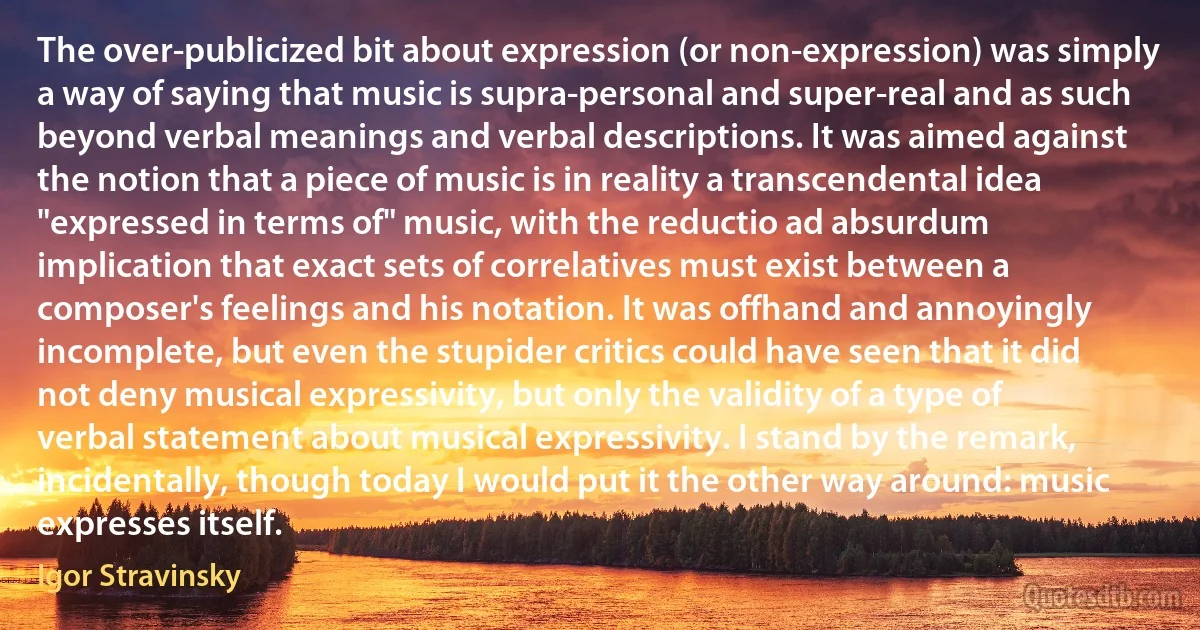
The over-publicized bit about expression (or non-expression) was simply a way of saying that music is supra-personal and super-real and as such beyond verbal meanings and verbal descriptions. It was aimed against the notion that a piece of music is in reality a transcendental idea "expressed in terms of" music, with the reductio ad absurdum implication that exact sets of correlatives must exist between a composer's feelings and his notation. It was offhand and annoyingly incomplete, but even the stupider critics could have seen that it did not deny musical expressivity, but only the validity of a type of verbal statement about musical expressivity. I stand by the remark, incidentally, though today I would put it the other way around: music expresses itself.
Igor StravinskyRelated topics
beyond bit idea implication music notation piece saying seen stand transcendental validity way today absurdumRelated quotes
Let us not despair; it is a blessed cause, and success, ere long, will crown our exertions. Already we have gained one victory; we have obtained, for these poor creatures, the recognition of their human nature, which, for a while was most shamefully denied. This is the first fruits of our efforts; let us persevere and our triumph will be complete. Never, never will we desist till we have wiped away this scandal from the Christian name, released ourselves from the load of guilt, under which we at present labour, and extinguished every trace of this bloody traffic, of which our posterity, looking back to the history of these enlightened times, will scarce believe that it has been suffered to exist so long a disgrace and dishonour to this country.

William Wilberforce
I am always interested in the ways of scoring the sound of the poem, especially a poem with long lines. Spaces within a line, double colons, slashes, are indications of pause, of breath, of urgency, they are not metrically exact as in a musical notation but they serve (I hope) to make the reader think about the sound of the poem-just as traffic symbols, when driving, make us almost unconsciously aware of a steep hill, an intersection, an icy bridge etc. Poets have used such indicators long before modernism-Dickinson's dashes and capitals are one example. Contemporary composers have also expanded on classical notation with new, self-invented markings. You want to find a way that is not random or chaotic but allows for various renderings of a line, a punctuation of the imagination.

Adrienne Rich
The purpose of art is expression. Of course this short sentence raises many questions. By itself it is uninformative. One should specify what art can and cannot express. One should specify what art should and should not express. These questions cannot be answered without having some notion of the nature of man. Here it is presupposed that God created man as essentially a rational being. This implies that man's most valuable expressions are rational and intellectual. Therefore, although man can express emotion, by screaming "Ouch,” art becomes more human and valuable in proportion to its intellectual content. This does not deny that excellent technique may express triviality, evil, and insanity. It asserts, however, that what should be expressed is rational and intelligent.

Gordon Clark
I believe in limited government. I believe that government should be limited in many ways, and what I am going to emphasize is only an intellectual thing. I don't want to talk about everything at the same time. Let's take a small piece, an intellectual thing.No government has the right to decide on the truth of scientific principles, nor to prescribe in any way the character of the questions investigated. Neither may a government determine the aesthetic value of artistic creations, nor limit the forms of literary or artistic expression. Nor should it pronounce on the validity of economic, historic, religious, or philosophical doctrines. Instead it has a duty to its citizens to maintain the freedom, to let those citizens contribute to the further adventure and the development of the human race.

Richard Feynman
Although he was completely illiterate, if he looked at a book which was incorrect, which contained some false statement, or which aimed at deceiving the reader, he immediately put his finger on the offending passage. If you asked him how he knew this, he said that a devil first pointed out the place with its finger...When he was harried beyond endurance by these unclean spirits, Saint John's Gospel was placed on his lap, and then they all vanished immediately, flying away like so many birds. If the Gospel were afterwards removed and the History of the Kings of Britain by Geoffrey of Monmouth put there in its place, just to see what would happen, the demons would alight all over his body, and on the book, too, staying there longer than usual and being even more demanding.

Gerald of Wales
